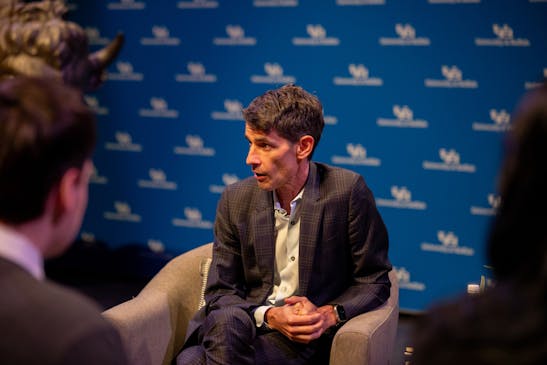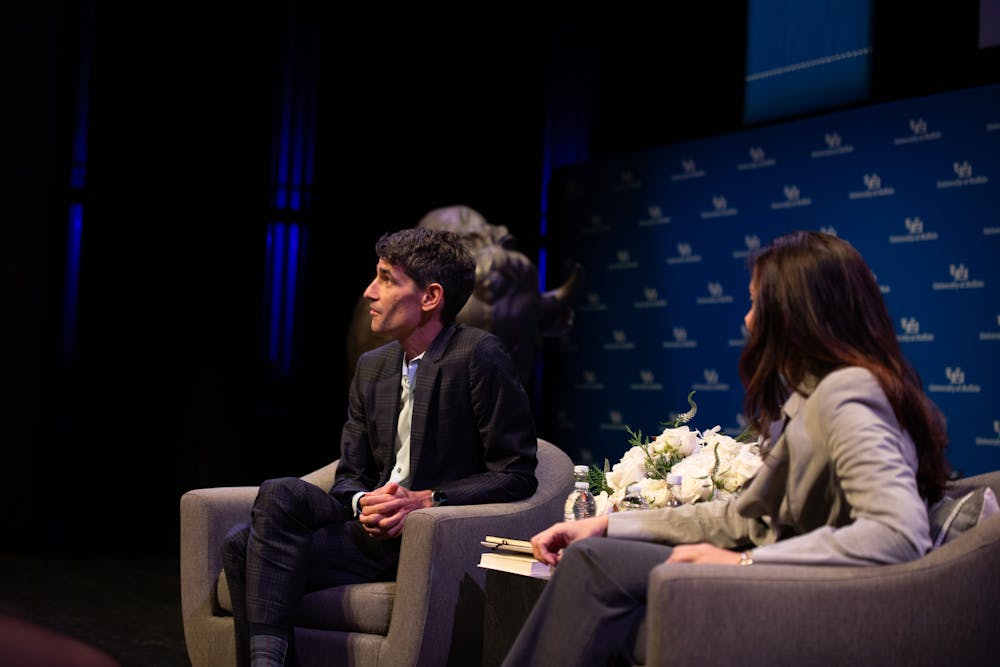Hundreds of eyes were glued to the projector in the UB Center for the Arts’ Mainstage Theatre. On the screen, a cartoon woman finished an important memo at her desk. As she leaned back in her chair, her work-issued, brain-monitoring earbuds sensed her relaxation and automatically began playing her favorite music.
She looked at her brain data from the past day: she’d been really stressed while trying to meet that deadline. But that stress was apparently paying off. Her employer had given her a raise based, in part, on her brain data and obedience. Good thing she’d quashed that crush on her new co-worker. Intra-office romance is forbidden, and romantic thoughts at work could’ve gotten her in hot water with her manager.
This might sound like a fictional dystopia. But according to UB’s latest distinguished speakers, it’s a reality that’s nearly here.
Thursday night’s event, titled “AI and the Future of Everything,” featured Nick Thompson, the CEO of The Atlantic, and Nita Farahany, an AI scholar at Duke University and author of “The Battle for Your Brain.” They spoke about AI, the emerging field of neurotechnology, and how the two will challenge individuals’ “cognitive liberty” as part of UB’s Distinguished Speaker Series.
Thompson took the stage first, describing the “Cambrian explosion” in usage of AI chatbots and large language models. He said that AI is the most important invention in the lives of his three young sons, and that he is “obsessed” with the new technology. Thompson added that AI is revolutionizing at The Atlantic, and that his publication in turn is helping AI evolve.
“If you look at the training sets that were used by some of these large language models, the foundational data, The Atlantic is a huge part of it. Media is a huge part of it. The Atlantic is the ninth-most-cited source,” he said.
Thompson said AI will change how people find and read The Atlantic, and likely create new competitors for the magazine. But he has broader concerns as well.

Nick Thompson, pictured above, asked Nita Farahany questions during the second half of their presentation.
“Will AI make the world more equal, or more unequal?” he asked. “One of the most disappointing things to me about the last technological revolution was that tech, the internet hurt democracy and helped authoritarianism. Will the same be true of AI? I don’t know.”
After his opening remarks, Thompson invited Farahany to the lectern, who opened her remarks with the aforementioned video.
“Is that a future you’re ready for?” she said. “People say ‘no,’ but it’s a future that’s nearly here. AI is transforming everything, everything about what it means to be human.”
Farahany led the audience through some of the latest innovations in AI and neurotechnology, including the development of wearable consumer devices that can sense brain waves. The data collected from these devices, Farahany said, can recreate mental images, monitor productivity, remote control computers and better understand brain activity.
She says Meta, the company that owns Facebook, plans to release a wristband that can sense brain activity and use it to control a computer without a mouse or keyboard as early as 2025. Apple also now holds a patent for brain-monitoring AirPods.
Farahany also explored the possibilities of neurotechnology to collect brain data and use AI datasets to better understand and treat mental illness, epilepsy and other conditions like dementia and ALS.
This possibility, she says, comes with a catch. Like with social media, when powerful groups have access to a large amount of consumer data, they tend to abuse it.
She said that there are over 150 “neuromarketing firms” that will use this data to influence consumers and that several national governments are already using brain activity as evidence in criminal trials. She also touched on “cognitive warfare,” or the use of weapons that target cognitive functions, which she implied may have caused cases of “Havana Syndrome” experienced by American diplomats around the world.
In light of these possibilities and threats, Farahany says that individuals’ “cognitive liberty,” or self determination over their brains and mental experiences, must be preserved as AI becomes more integrated in everyday life. She called on governments and policymakers to adapt human rights laws to incorporate protections against misuse of this new technology.
“To embrace this coming era, we have to begin by recognizing a right to cognitive liberty,” she said. “A right to cognitive liberty would give us the right to access and use these technologies, and access to information about ourselves. But also… to protect us against the interception, manipulation and punishment of our thoughts.”
Thompson and Farahany spent the latter half of their time on stage going back and forth about the hypothetical uses and mysteries of AI. Their discussion ranged from the use of AI to read employees’ thoughts and solve crimes to questions like “Are minds replicable by AI?” and “Has AI challenged your assumptions about the human brain?”
“Can a large language model ever approximate human thought?” Thompson asked.
“The full complexity of human thought is multi-layered and integrated with our memories and our history, our relationships with each other,” Farahany said. “I don’t think large language models are likely to get anywhere close to that, but I don’t think it’s theoretically impossible either.”
Ryan Tantalo is the managing editor and can be reached at ryan.tantalo@ubspectrum.com
Grant Ashley is the editor in chief and can be reached at grant.ashley@ubspectrum.com

Ryan Tantalo is the managing editor of The Spectrum. He previously served as senior sports editor. Outside of the newsroom, Ryan spends his time announcing college hockey games, golfing, skiing and reading.

Grant Ashley is the editor in chief of The Spectrum. He's also reported for NPR, WBFO, WIVB and The Buffalo News. He enjoys taking long bike rides, baking with his parents’ ingredients and recreating Bob Ross paintings in crayon. He can be found on the platform formerly known as Twitter at @Grantrashley.





